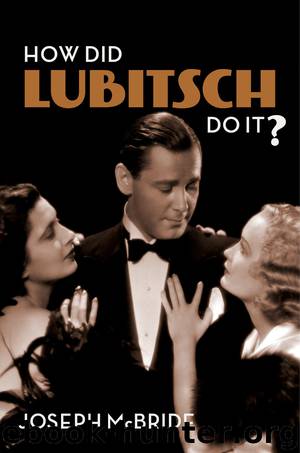How Did Lubitsch Do It? by Joseph McBride

Author:Joseph McBride
Language: eng
Format: epub
Publisher: Columbia University Press
PERFECTION
“Trifles make perfection,” said Michelangelo, “and perfection is no trifle.” Lubitsch’s singling out one of his own films for its pure style suggests that he felt he had achieved a distillation of his artistic methodology, an ultimate precision that his other films, for all their qualities, do not quite achieve. Previous Lubitsch films to which the word “perfect” can fairly be applied—such as The Oyster Princess, The Marriage Circle, and Lady Windermere’s Fan—contain many memorable and audaciously conceived sequences and litanies of breathtaking touches. They are fully satisfying achievements in their genres or in their clever combinations of genre elements. But Lubitsch almost always works at such a level of accomplishment that even when his films are uneven or flawed, they are filled with so many dazzling moments and scenes that the flaws often seem relatively minor.
Following the example of his theatrical mentor Max Reinhardt, Lubitsch, by the time of Trouble in Paradise, had perfected a style that brought all his dramatic and pictorial devices into play at the same time. The truism that style equals content and is not some kind of separate entity applies to Lubitsch at his most elaborately stylized as much it does to the work of any other artist. And yet in trying to define the perfection of his style in Trouble in Paradise, by analyzing gags, touches, sequences, or the entire flawless construction of the story, there is some other quality that remains elusive. This is the essence of what film historian James Naremore calls the “ineffable” nature of Lubitsch. Welles said something similar to Bogdanovich: “I think more highly of Lubitsch as the years go by, all the time.… There was a sort of spirit that pervaded his films that you can’t analyze.” Welles did not comment on specific Lubitsch films that impressed him, but Patrick McGilligan’s biography Young Orson reports that one of the films Welles watched on a visit to New York in 1932, when he was about seventeen, was Trouble in Paradise. Welles then spent a couple of years vainly pursuing Raphaelson, who was also a playwright, for help in trying to launch his own career in the theater.
While it is true that Lubitsch’s work is difficult to analyze, if I were to accept the argument that it cannot be analyzed, I would not be writing this book. Truffaut does not seem to agree with Welles’s head-shaking wonderment, writing instead that Lubitsch’s “cinema is the opposite of the vague, the imprecise, the unformulated, the incommunicable.” So what exactly is it that Lubitsch communicates that no one else can, and how does he communicate it in this, the most perfect of his films? What precisely is the substance that expresses itself lucidly in his ineffable style?
Perhaps the difficulty comes with any attempt to reduce Lubitsch’s meaning to words. As with any good film, the screenplay is only a blueprint, a guideline. This is true even though Raphaelson’s scripts were so precisely written and detailed, composed with Lubitsch’s constant input, and followed with a fidelity rare in the film industry.
Download
This site does not store any files on its server. We only index and link to content provided by other sites. Please contact the content providers to delete copyright contents if any and email us, we'll remove relevant links or contents immediately.
| Coloring Books for Grown-Ups | Humor |
| Movies | Performing Arts |
| Pop Culture | Puzzles & Games |
| Radio | Sheet Music & Scores |
| Television | Trivia & Fun Facts |
The Kite Runner by Khaled Hosseini(5179)
Gerald's Game by Stephen King(4654)
Dialogue by Robert McKee(4404)
The Perils of Being Moderately Famous by Soha Ali Khan(4220)
The 101 Dalmatians by Dodie Smith(3511)
Story: Substance, Structure, Style and the Principles of Screenwriting by Robert McKee(3469)
The Pixar Touch by David A. Price(3439)
Confessions of a Video Vixen by Karrine Steffans(3309)
How Music Works by David Byrne(3270)
Harry Potter 4 - Harry Potter and The Goblet of Fire by J.K.Rowling(3074)
Fantastic Beasts: The Crimes of Grindelwald by J. K. Rowling(3059)
Slugfest by Reed Tucker(3004)
The Mental Game of Writing: How to Overcome Obstacles, Stay Creative and Productive, and Free Your Mind for Success by James Scott Bell(2909)
4 - Harry Potter and the Goblet of Fire by J.K. Rowling(2703)
Screenplay: The Foundations of Screenwriting by Syd Field(2643)
The Complete H. P. Lovecraft Reader by H.P. Lovecraft(2563)
Scandals of Classic Hollywood: Sex, Deviance, and Drama from the Golden Age of American Cinema by Anne Helen Petersen(2524)
Wildflower by Drew Barrymore(2489)
Robin by Dave Itzkoff(2441)
